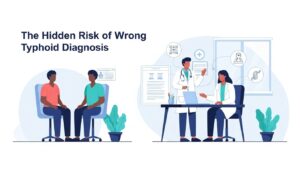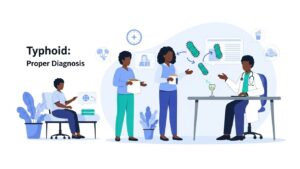Having high blood pressure during pregnancy known as gestational hypertension or preeclampsia requires careful attention and monitoring. At Well-Life Hospital, we’re committed to providing you with the best care to ensure a healthy pregnancy for you and your baby. This guide will help you understand the potential risks associated with hypertension during pregnancy and how to manage them effectively.
What is High Blood Pressure in Pregnancy?
Sometimes, high blood pressure, also known as hypertension, is present before you become pregnant. In other cases, it can develop during the pregnancy itself, a condition known as gestational hypertension or preeclampsia.
Nigerian Statistics: According to a study published in the ncbi, In Nigeria, it is estimated that 5-10% of pregnancies are complicated by hypertensive disorders in pregnancy , making it a significant health concern for pregnant women in the country.
Risks of High Blood Pressure During Pregnancy
High blood pressure can pose several risks to both the mother and the baby. These risks include:
- Preeclampsia: This is a serious condition characterized by high blood pressure and signs of organ damage, most often the liver and kidneys. Previously, preeclampsia was diagnosed based on high blood pressure and protein in the urine. However, experts now recognize that preeclampsia can occur even without protein in the urine. Untreated preeclampsia can lead to severe complications.
- Eclampsia: A severe form of preeclampsia that can cause seizures, leading to life-threatening situations for both mother and baby.
- Stroke: High blood pressure significantly increases the risk of stroke during pregnancy.
- Preterm birth: Women with high blood pressure are more likely to deliver prematurely.
- Low birth weight: High blood pressure can affect the baby’s growth, leading to low birth weight.
- Placental abruption: This occurs when the placenta separates from the wall of the uterus, depriving the baby of oxygen and nutrients.
Recognizing the Signs
Monitoring your blood pressure is an essential part of prenatal care at Well-Life Hospital. If you have chronic hypertension, your healthcare provider will closely monitor your blood pressure readings. Gestational hypertension is typically diagnosed after 20 weeks of pregnancy when blood pressure readings exceed 140/90 mm Hg on two or more occasions, at least four hours apart.
In addition to high blood pressure, other signs and symptoms of preeclampsia include:
- Severe headaches
- Vision changes, such as blurred vision or seeing spots
- Upper abdominal pain
- Nausea or vomiting
- Shortness of breath
- Sudden weight gain and swelling, especially in the face and hands
- Bleeding
Important Note: Swelling is common during pregnancy, but the swelling associated with preeclampsia is usually more severe.
Management and Treatment
Effective management of high blood pressure during pregnancy is crucial. Here’s how Well-Life Hospital can help:
- Medication: Some blood pressure medications are safe to use during pregnancy. However, certain medications like ACE inhibitors, angiotensin II receptor blockers, and renin inhibitors should be avoided. If medication is needed, your doctor will prescribe the safest option at the appropriate dose.
- Lifestyle Modifications: Maintaining a healthy lifestyle is important. This includes:
- Eating a balanced diet with reduced salt intake.
- Regular, moderate exercise as advised by your doctor.
- Getting enough rest.
- Avoiding alcohol and tobacco.
- Regular Monitoring: Frequent check-ups are essential. Your weight and blood pressure will be monitored at each visit. You may also need frequent laboratory tests to assess your kidney and liver function.
- Fetal Monitoring: Your baby’s health will also be closely monitored using ultrasound to track growth and fetal testing to evaluate well-being. Your doctor may also recommend that you monitor your baby’s daily movements.
Preconception Counseling
If you have high blood pressure and are planning to become pregnant, schedule a preconception appointment with a healthcare provider at Well-Life Hospital who specializes in managing pregnancies complicated by hypertensive disorders. They will assess your current condition, review your medications, and make any necessary adjustments before you conceive.
If you are overweight, your healthcare provider may recommend losing weight before pregnancy.
Prevention Strategies
Research suggests that low-dose aspirin can lower the risk of preeclampsia in women at high risk. Your healthcare provider may recommend a daily low dose of aspirin (75mg-81mg) starting late in the first trimester. Always consult your doctor before starting any medication during pregnancy.
Delivery Considerations
Depending on how well your blood pressure is controlled and whether there are any complications, your healthcare provider may recommend inducing labor before your due date.
If you have preeclampsia and the condition is worsening, you may be given medication during labor to prevent seizures.
Postpartum Care
Breastfeeding is encouraged for most women with high blood pressure, even those who take medication. Discuss your medications with your healthcare provider before your baby is born to ensure they are safe for breastfeeding.
Contact Well-Life Hospital
We are dedicated to providing comprehensive care for women with high blood pressure during pregnancy. Our team of experts will work with you to develop a personalized plan to manage your condition and ensure the best possible outcome for you and your baby.






